WASHINGTON — The parts of Alexandria’s sewage system that dump raw sewage into the Potomac River when it rains now must be transformed by 2025, after Virginia Gov. Terry McAuliffe signed a bill the city had vocally opposed.
McAuliffe “supports the outcome the bill is trying to achieve, and recognizes that the city still has several General Assembly sessions to petition for more time if they are unable to meet the deadline the bill imposes,” spokesman Brian Coy said in an email.
The city was notified Friday of the governor’s action, city communications director Craig Fifer said.
“We are disappointed that the legislation includes an earlier deadline than the experts have deemed feasible,” he said.
The bill requires the outfalls all be dealt with by 2025, most likely by building new storage tanks that could hold contaminated water during heavy rains.
The city will continue to “work aggressively” to deal with all four of its outfalls, Fifer said, adding a later deadline would have been more realistic.
This month, the General Assembly rejected McAuliffe’s proposed amendments that would have extended the deadline as far out as 2030.
The city had planned to fix the fourth and largest outfall by 2035, but said during negotiations over the bill that it might be possible to complete the complex engineering work by 2028.
Alexandria plans to raise sewage and other fees to cover the construction.
Sen. Scott Surovell, who represents an area of Fairfax County near Alexandria, applauded McAuliffe’s decision to sign the bill, citing environmental advocacy group studies that suggested work could be done by 2024.
The city has competent and creative employees who will work hard to meet the deadline, Surovell said in a statement, adding that “many of us” are eager to find necessary state funding.
“Americans built the Hoover Dam in six years, put a man on the moon in eight years, and we built the Chesapeake Bay-Bridge Tunnel in 43 months,” Surovell said. “I’m sure Alexandria can build a storage room the size of a high school gym, along with a pipe to connect the storage chamber with a sewage line, in eight years.
“Alexandria is not Central America, and Virginians don’t dump raw sewage in our rivers, which are enjoyed by everyone,” he added.
Fifer called such comparisons “apples and oranges.”
“Each one of these projects is unique, and they each occur in different political and financial contexts as well,” Fifer said.
The bill does not apply to any other Virginia jurisdictions with similar sewage issues. Alexandria is one of more than 800 communities across the country working to deal with similar sewage overflows.
“The existing legislation will allow Alexandria to dump about 1.2 billion gallons or 1,800 Olympic-size swimming pools of raw sewage into the Potomac River over the next eight years. I think that’s enough,” Surovell said.






